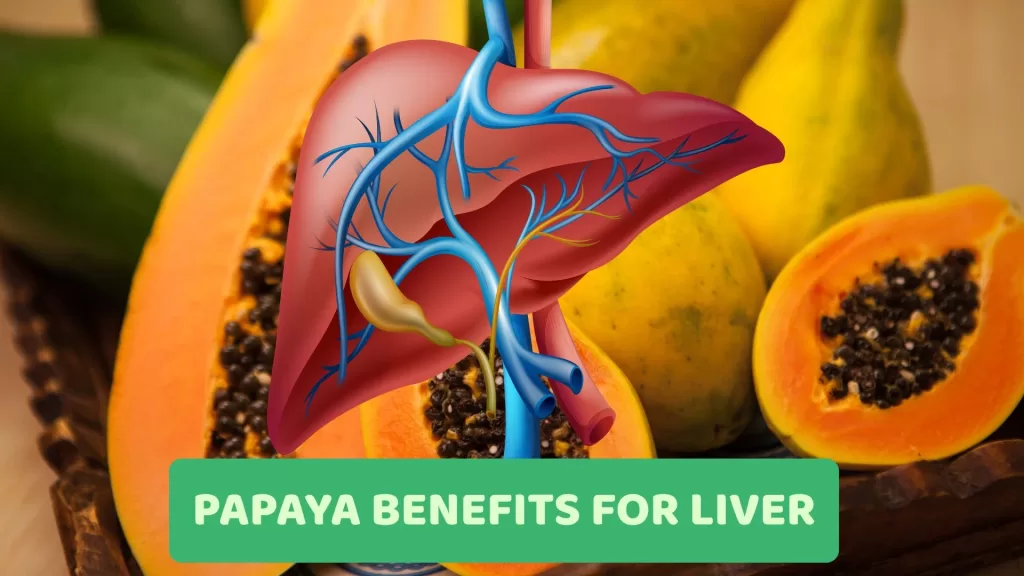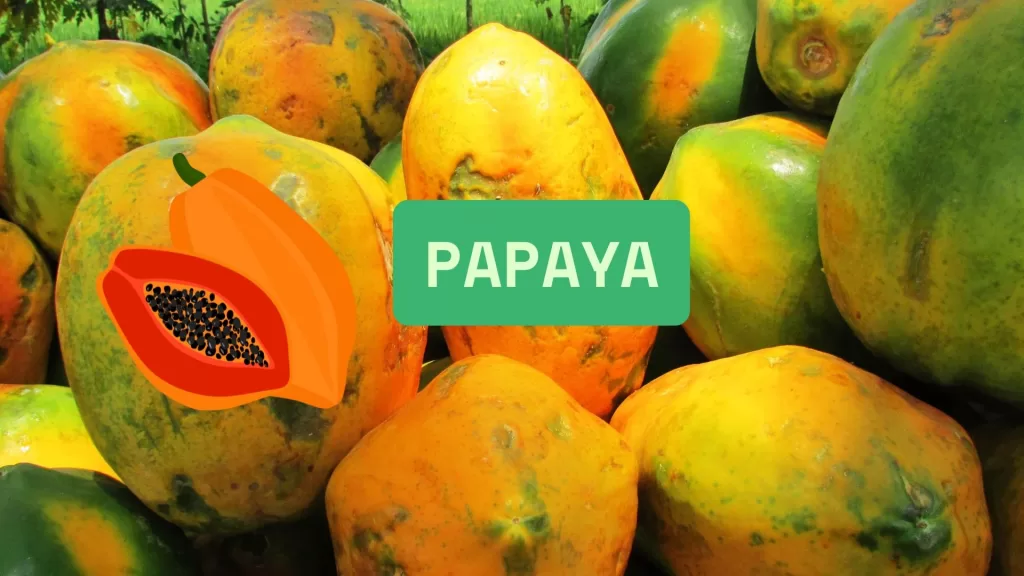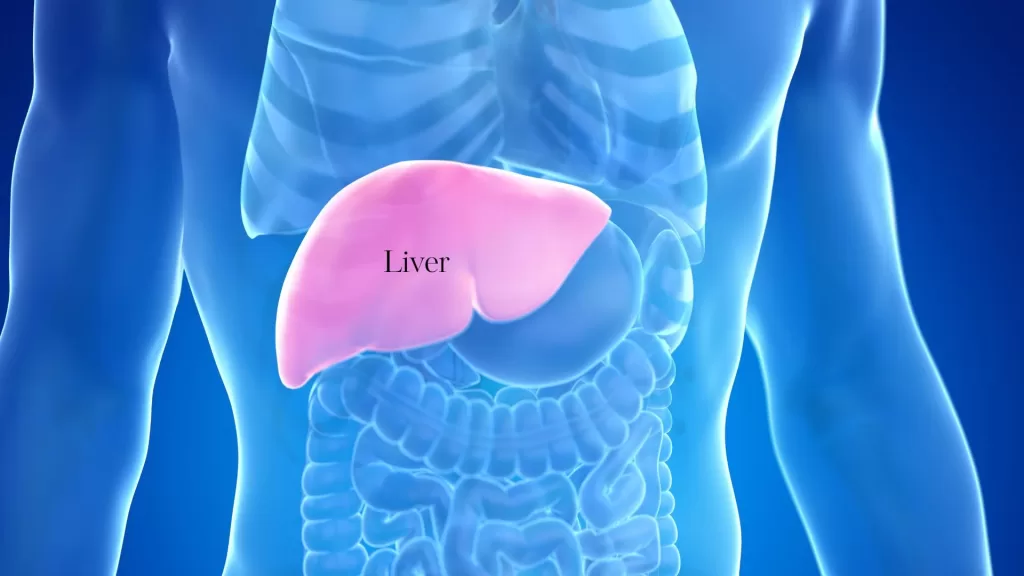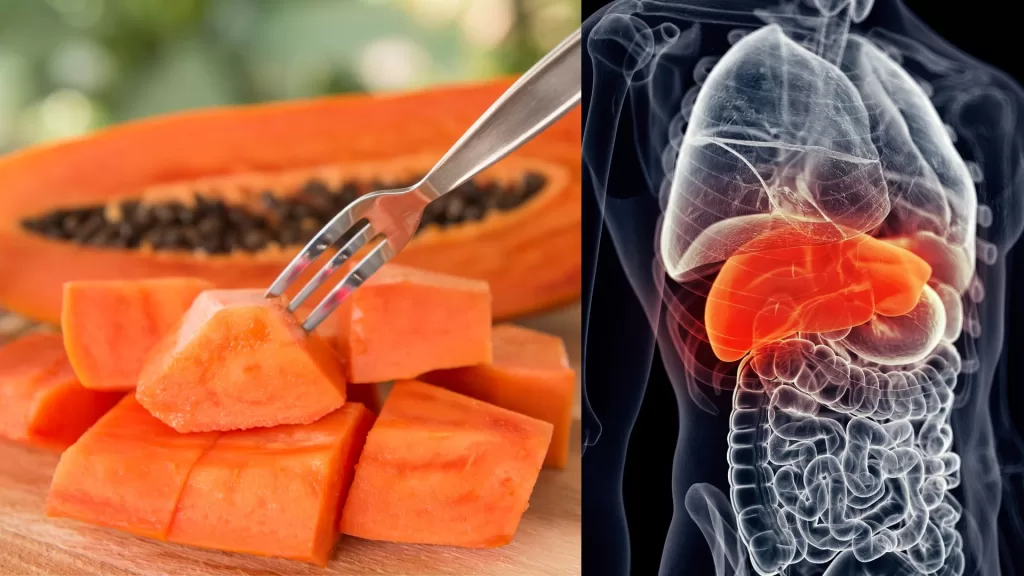Papaya benefits for liver: Papaya is a natural liver booster in addition to being a tasty tropical fruit. Packed with antioxidants like beta-carotene and vitamin C, as well as potent enzymes like papain, papaya aids in liver inflammation reduction and toxin removal. Papaya’s capacity to promote detoxification by assisting with digestion and breaking down fats reduces the workload on the liver, making it one of the main advantages for liver health. Frequent papaya consumption may also improve liver enzyme levels and aid in the management of fatty liver conditions.

By keeping dangerous toxins from building up, its natural fiber supports gut health and indirectly improves liver function. Papaya provides mild yet efficient liver support, whether it is eaten raw, in juice, or as part of a well-rounded diet. A quick and delicious way to safeguard your liver and enhance your general health is to incorporate papaya into your daily routine.
Hello! I am Dr. Sankha Subhra Basu, General Physician, MBBS, MD (CERT), with over 22 years of experience in Medical Science. As a Healthcare and nutrition expert, I am writing this article about the Papaya Benefits for Liver to Support Health, explaining how this luscious superfood helps your liver naturally. Read this article for better knowledge and experience.
Key Takeaways
- Papaya contains powerful enzymes like papain that support liver detoxification and improve digestion
- Scientific research shows papaya can help reduce inflammation and fat accumulation in the liver
- The fruit’s high antioxidant content helps protect liver cells from oxidative damage
- Regular consumption may help prevent and potentially reverse non-alcoholic fatty liver disease
- Papaya seeds have additional hepatoprotective properties that complement the fruit’s benefits
Introduction to Papaya and Liver Health
As your body’s main detoxification organ, your liver puts forth endless effort to filter toxins from food, drugs, and environmental exposures. Liver health has grown in significance in our contemporary world of processed foods and environmental contaminants. Thankfully, papaya is one of nature’s most potent liver-supporting allies.
The tropical fruit known as papaya (Carica papaya) is prized for both its remarkable nutritional profile and its sweet flavor. In addition to its mouthwatering taste, papaya has outstanding liver health benefits supported by scientific studies. This colorful orange fruit should play a significant role in your liver-healthy diet because it aids in detoxification and guards against fatty liver disease.
This thorough guide offers you practical advice on how to include this potent fruit in your wellness regimen while examining nine scientifically supported papaya benefits for liver health. Knowing how papaya supports this essential organ can have a big impact on your general health, whether you’re actively trying to enhance liver function or just want to keep your liver in the best possible condition.
What is Papaya?
Originally from southern Mexico and Central America, papayas, also called Carica papaya, are tropical fruits that are now grown all over the world. It has round, black seeds in the middle of soft, orange flesh that tastes sweet and musky. The fruit is well-liked for both its flavor and its remarkable health advantages.

Vitamins C, A, folate, potassium, and fiber are all abundant in papaya. Among its most noteworthy constituents is papain, a potent enzyme that promotes detoxification and facilitates digestion, making it particularly advantageous for gut and liver health.
Traditional medicine has utilized both the fruit and its seeds to treat a range of conditions, such as inflammation, liver problems, and digestive problems. Papaya is rich in antioxidants, such as beta-carotene and flavonoids, which help fend off free radicals and shield the body’s organs from harm. It is also low in calories.
Papaya is a wholesome and adaptable fruit that can be eaten raw, blended into smoothies, or drunk as juice. It is a well-liked option for promoting liver health and enhancing general well-being because of its natural cleansing qualities and enzyme-rich composition.
Nutritional Profile of Papaya
Before diving into the specific papaya benefits for liver health, it’s important to understand the nutritional composition that makes this fruit so effective. Papaya is packed with vitamins, minerals, enzymes, and antioxidants that work synergistically to support liver function.
| Nutrient | Amount per 100g | Daily Value (%) | Benefits for Liver |
|---|---|---|---|
| Vitamin C | 61.8 mg | 69% | Powerful antioxidant that reduces oxidative stress in liver cells |
| Vitamin A | 950 IU | 19% | Supports liver cell regeneration and immune function |
| Folate (B9) | 38 μg | 10% | Essential for liver cell division and repair |
| Potassium | 257 mg | 7% | Helps maintain electrolyte balance for optimal liver function |
| Fiber | 1.7 g | 7% | Supports digestion and prevents fat accumulation in the liver |
| Magnesium | 10 mg | 2.5% | Required for hundreds of enzyme reactions in the liver |
| Papain | Variable | N/A | Enzyme that aids protein digestion, reducing liver workload |
| Lycopene | 1.8 mg | N/A | Carotenoid with potent antioxidant properties |
| Beta-carotene | 276 μg | N/A | Converted to vitamin A, supports liver cell health |
Scientific Proof in Favor of Papaya for Liver Health
The connection between papaya and liver health isn’t just anecdotal. Multiple scientific studies have demonstrated the hepatoprotective (liver-protecting) effects of papaya. Here’s a summary of key research findings:

Research on Papaya and Non-Alcoholic Fatty Liver Disease
A groundbreaking study published in the Journal of Clinical Gastroenterology and Hepatology demonstrated that papaya consumption significantly improved non-alcoholic fatty liver disease (NAFLD) in higher-weight rats1. The researchers found that papaya reduced liver inflammation by inhibiting the overproduction and activity of proinflammatory cytokines generated in high-fat-induced hepatic inflammation tissue.
The study concluded that papaya “could be used to prevent or treat Non-alcoholic fatty liver disease” through multiple mechanisms, including:
- Decreasing hepatic total cholesterol and triglyceride levels
- Reducing malondialdehyde (a marker of oxidative stress)
- Lowering inflammatory markers including TNF-α and IL-6
- Increasing antioxidant enzyme activities (catalase and superoxide dismutase)
- Suppressing lipogenic gene expression
Papaya Enzymes and Liver Detoxification
Research published in the Journal of Medicinal Food explored how papain, the primary enzyme in papaya, supports liver function2. The study found that papain helps:
- Break down complex proteins, reducing the liver’s metabolic burden
- Support phase I and phase II liver detoxification pathways
- Promote the elimination of toxins from the liver
Antioxidant Effects on Liver Health
A 2021 review in the Journal of Ethnopharmacology analyzed the antioxidant properties of papaya and their impact on liver function3. The review concluded that the antioxidants in papaya, particularly vitamin C and carotenoids, help:
- Neutralize free radicals that can damage liver cells
- Protect liver cell membranes from oxidative damage
- Maintain the integrity of liver mitochondria
- Support overall liver cell health and function
The 9 Papaya Benefits for Liver Health
In addition to being a delicious tropical fruit, papaya is a natural liver ally. Packed with vital nutrients, enzymes, and antioxidants, papaya supports, protects, and cleanses the liver. This potent fruit has a variety of therapeutic benefits, whether your goal is to support detoxification or avoid liver damage. Let’s examine the top 9 liver-healthy papaya benefits that can improve your general well-being.

Based on scientific research and traditional medical knowledge, here are nine specific ways papaya supports and improves liver health:
1. Encourages the Detoxification of the Liver
The main organ in your body for detoxification is your liver, which removes toxins from your blood. Papain, a potent enzyme found in papaya, helps break down proteins and lessens the metabolic load on the liver. Furthermore, papaya’s high fiber content aids in the binding and removal of toxins via the digestive system.
Your liver can operate more effectively thanks to the papain enzyme, which dissolves and removes dead tissues without harming healthy cells. Frequent papaya consumption can improve your liver’s natural detoxification functions, assisting your body in more efficiently getting rid of toxins from food, drugs, and environmental exposures.
2. Lowers Inflammation of the Liver
Serious diseases like cirrhosis and hepatitis can result from persistent inflammation in the liver. Strong anti-inflammatory substances found in papaya aid in lowering liver inflammation1. Studies have demonstrated that papaya extract dramatically lowers inflammatory markers in liver tissue, such as TNF-α and IL-6.
By preventing the overproduction and activity of proinflammatory cytokines, papaya has been shown in studies to help lower liver inflammation. People with liver-inflammatory diseases like non-alcoholic steatohepatitis (NASH) benefit most from this anti-inflammatory action.
3. Prevents Fat Accumulation in Liver
When fat accumulates in liver cells, fatty liver disease develops. By inhibiting hepatic lipid accumulation, papaya has been demonstrated to prevent and possibly even reverse this condition1,5. Because of its capacity to control fat metabolism, the fruit helps keep liver cells from storing too much fat.
According to research, papaya inhibits fatty acid synthase (FAS) and sterol regulatory element-binding protein 1c (SREBP-1c), two transcriptional factors involved in hepatic lipogenesis. Papaya helps maintain a healthy liver free from excessive fat deposits, which can impair liver function when present in large amounts, by blocking these fat-producing pathways.
4. Enhances Antioxidant Activity in Liver Cells
One of the main causes of liver damage is oxidative stress. Antioxidants found in papaya, such as vitamin C, vitamin A, and flavonoids, help scavenge dangerous free radicals that can harm liver cells 1,3. Together, these antioxidants guard against oxidative damage to DNA and liver cell membranes.
Research indicates that papaya considerably boosts the activity of important antioxidant enzymes, such as superoxide dismutase (SOD) and catalase (CAT). By transforming dangerous reactive oxygen species into less dangerous compounds that can be safely removed from the body, these enzymes serve as the body’s first line of defense against oxidative damage.
5. Regulates Cholesterol Metabolism
Liver disease may be exacerbated by elevated cholesterol levels. It has been demonstrated that papaya aids in controlling the liver’s metabolism of cholesterol1, 6. According to research, papaya helps maintain healthy cholesterol levels by lowering hepatic total cholesterol.
Rats given papaya had much lower hepatic cholesterol levels than the control group, according to a study published in the Journal of Clinical Gastroenterology and Hepatology. Those with metabolic syndrome or other disorders linked to elevated cholesterol levels may benefit most from this cholesterol-regulating effect.
6. Promotes Liver Cell Regeneration
Your liver is remarkably capable of regeneration. Nutrients in papaya aid in this regenerative process, enabling damaged liver cells to heal themselves 7. The fruit’s high vitamin and mineral content supplies the building blocks required for the regeneration of liver cells.
Papaya’s high vitamin A content, which is essential for cell division and differentiation, is especially remarkable. Furthermore, papaya’s folate (vitamin B9) promotes DNA synthesis, which is necessary for the regeneration of liver cells. Papaya aids in the maintenance of a healthy, functioning liver even following exposure to toxins or other types of damage by promoting these processes.
7. Supports Bile Production and Flow
The breakdown of fat and the liver’s removal of toxins depend on bile. It has been discovered that papaya enhances bile flow and promotes bile production. Papaya aids in the liver’s effective removal of waste and toxins by increasing bile production.
Papaya enzymes encourage the production of bile by liver cells, which is necessary for the breakdown and absorption of fats and fat-soluble vitamins. Toxins can be effectively removed through the digestive tract rather than building up in the body thanks to improved bile flow, which also supports the liver’s detoxification functions and helps avoid gallstones.
8. Modulates Liver Enzyme Levels
Increased liver enzymes frequently signify illness or damage to the liver. According to research, papaya may help normalize the levels of liver enzymes such as alanine aminotransferase (ALT) and aspartate aminotransferase (AST)1,9. Better liver function is indicated by this normalization.
Papaya extract has been found to lower elevated liver enzymes in liver dysfunction. The anti-inflammatory and antioxidant qualities of papaya, which aid in preventing damage to liver cells and promoting general liver health, are probably the cause of this effect. Restoring normal liver enzyme levels is a key sign of better liver health.
9. Protects Against Liver Infections
Compounds with antimicrobial qualities found in papaya may help shield the liver from infections 10. Papain and other proteolytic enzymes are among these substances, which have been demonstrated to stop the growth of some infections.
Papaya’s antimicrobial qualities may be especially helpful for those who are susceptible to liver infections, such as those with weakened immune systems. Papaya contributes to the maintenance of a healthy liver environment that is resistant to infectious agents that could otherwise cause liver damage by boosting the immune system and offering direct antimicrobial action.
How to Consume Papaya for Maximum Liver Benefits
To experience the full range of papaya benefits for liver health, it’s important to consume it properly. Here are the best ways to incorporate papaya into your diet for liver health:
Recommended Dosage
According to nutritionists and the available research, the following consumption guidelines are recommended for optimal liver benefits:
- Fresh papaya: 100-150 grams (approximately 1 cup) daily
- Papaya seeds: 5-10 seeds daily, crushed or ground
- Papaya leaf extract: As directed on supplement packaging (typically 1-2 capsules daily)
Best Times to Consume
For maximum liver benefits, consider these timing suggestions:
- Morning consumption: Eating papaya on an empty stomach in the morning can help kickstart digestion and detoxification processes11
- Between meals: Consuming papaya as a mid-morning or afternoon snack can support ongoing liver function
- After exposure to toxins: Eating papaya after alcohol consumption or exposure to environmental toxins may help support liver detoxification
Preparation Methods
Different preparation methods can enhance specific papaya benefits for liver health:
- Raw papaya: Preserves enzymes and maximizes nutritional content, best for detoxification
- Papaya smoothies: Blending papaya with other liver-friendly ingredients like ginger or turmeric can enhance its benefits
- Papaya seeds: Crushing seeds and mixing with honey or adding to smoothies provides additional liver benefits from the seed compounds
- Papaya leaf tea: Steeping papaya leaves in hot water creates a bitter but medicinal tea that supports liver function
Papaya vs. Other Liver-Friendly Foods
While papaya offers impressive benefits for liver health, it’s helpful to understand how it compares to other foods commonly recommended for liver support:
| Food | Key Liver Benefits | Active Compounds | Effectiveness | Best For |
|---|---|---|---|---|
| Papaya | Detoxification, reducing inflammation, preventing fat accumulation | Papain, vitamin C, carotenoids | ⭐⭐⭐⭐⭐ | Overall liver health, fatty liver, inflammation |
| Turmeric | Anti-inflammatory, antioxidant, bile production | Curcumin | ⭐⭐⭐⭐ | Liver inflammation, bile flow |
| Garlic | Detoxification, antioxidant, antimicrobial | Allicin, selenium | ⭐⭐⭐⭐ | Liver detoxification, fatty liver |
| Beetroot | Detoxification, antioxidant, bile flow | Betalains, betaine | ⭐⭐⭐⭐ | Blood cleansing, fatty liver |
| Milk Thistle | Cell regeneration, antioxidant, detoxification | Silymarin | ⭐⭐⭐⭐⭐ | Liver damage, cirrhosis |
| Green Tea | Antioxidant, fat reduction, detoxification | Catechins, EGCG | ⭐⭐⭐⭐ | Fatty liver, oxidative stress |
| Grapefruit | Detoxification, enzyme normalization | Naringenin, vitamin C | ⭐⭐⭐⭐ | Liver cleansing, fat metabolism |
While all these foods offer significant liver benefits, papaya stands out for its comprehensive approach to liver health. The combination of enzymes, antioxidants, and anti-inflammatory compounds in papaya provides support across multiple aspects of liver function, making it an excellent choice for overall liver health.
The Safety Measures and Possible Adverse Reactions
While papaya offers numerous benefits for liver health, it’s important to be aware of potential side effects and contraindications:
Who Should Exercise Caution
- Pregnant people: Unripe papaya and papaya seeds contain enzymes that may trigger contractions
- People with latex allergies: May experience cross-reactions with papaya
- Those taking blood thinners: Papaya may enhance the effect of these medications
- People with kidney disease: Should consult a healthcare provider due to papaya’s potassium content
- Individuals with diabetes: Should monitor blood sugar when consuming papaya regularly
The Likely Adverse Reactions
Although uncommon, some persons could encounter:
- Digestive upset when consuming large amounts
- Allergic reactions (skin rash, itching, swelling)
- Interaction with certain medications
- Excessive papaya seed consumption may cause digestive irritation
“My doctor advised me to include papaya in my daily diet after I was diagnosed with non-alcoholic fatty liver disease. My liver enzyme levels considerably improved in three months, and a subsequent scan revealed less liver fat. I firmly believe that papaya and other lifestyle modifications were crucial to my liver’s recovery.” – Michael T., 48.
Liver-Supporting Papaya Recipes
Incorporate these simple recipes into your routine to maximize the papaya benefits for liver health:
Morning Liver Detox Smoothie
Some Ingredients are:
- One cup of diced ripe papaya.
- 1/2 inch fresh ginger.
- 1/2 lemon, juiced.
- 5 papaya seeds (optional).
- 1 teaspoon honey (optional).
- 1/2 cup water or coconut water.
Directions are: Process all ingredients in a blender until smooth. Drink on an empty stomach in the morning.
Papaya Liver Cleanse Salad
Some Ingredients are:
- One cup of diced ripe papaya.
- 1 cucumber, sliced.
- 1/4 cup mint leaves.
- 1 tablespoon apple cider vinegar.
- 1 tablespoon olive oil.
- Pinch of black pepper.
- 1 teaspoon crushed papaya seeds (optional).
Instructions: Combine all ingredients in a bowl, toss gently, and enjoy as a mid-day liver-supporting snack.
Papaya Seed Tea
Some Ingredients are:
- 1 teaspoon dried, crushed papaya seeds.
- 1 cup hot water.
- 1/2 teaspoon honey (optional).
- A dash of lemon juice.
Instructions: Steep the crushed papaya seeds in hot water for 5-10 minutes. Strain, add honey and lemon if desired, and drink once daily.
Video Review: Papaya Health Benefits
Conclusion: Embracing Papaya for Liver Health
There is a growing body of scientific evidence demonstrating the benefits of papaya for liver health. Papaya provides complete support for this essential organ, from lowering inflammation and preventing fat buildup to improving detoxification and promoting liver cell regeneration.
You can take advantage of these advantages and promote liver health by including papaya regularly in your diet. Papaya can be a useful supplement to your wellness regimen, regardless of whether you’re coping with a particular liver condition or just want to keep your liver functioning at its best.
Although papaya has many health benefits, it is most effective when used in conjunction with other holistic liver health strategies, such as:
- A balanced, whole-foods diet rich in fruits, vegetables, and fiber.
- Limited alcohol consumption.
- Continuous physical exercise.
- Adequate hydration.
- Avoiding poisons and needless medicines.
When these lifestyle choices are made, including papaya in your diet can give your liver the extra help it needs to perform at its peak, preserving your general health and vitality for many years to come.
Frequently Asked Questions About Papaya and Liver Health
Are you curious about how papaya helps your liver? You’re not by yourself. The amazing link between this tropical fruit and improved liver health is becoming widely known. Papaya provides natural support for one of your body’s most important organs, from its detoxifying properties to its role in managing a fatty liver.
We’ll address frequently asked questions concerning papaya’s liver-benefitting properties in this frequently asked questions section, such as how to eat it, how much to eat, and who should avoid it. These facts will assist you in making wise decisions, regardless of whether you’re battling liver problems or just trying to get healthier overall.
Q: How quickly can papaya improve liver health?
A: The length of time it takes to notice improvements varies based on your liver’s condition and personal health. While measurable improvements in liver function tests usually take several weeks to months, some people report feeling better about their digestion within days of regularly consuming papaya. After 8–12 weeks of consistent consumption, research on papaya and liver health typically reveals notable advantages.
Q: Is raw or ripe papaya better for liver health?
A: Raw and ripe papayas both benefit the liver, but in different ways. Antioxidants like beta-carotene and lycopene, which shield the liver from oxidative damage, are more abundant in ripe papaya. Higher levels of the papain enzyme, which aids in digestion and lessens the metabolic load on the liver, are found in raw (green) papaya. Although ripe papaya is usually more palatable for most people, including both types in your diet can be helpful for overall liver support.
Q: Can papaya reverse liver damage?
A: According to scientific research, papaya may help reverse some liver damage, especially non-alcoholic fatty liver disease (NAFLD). In rats with NAFLD1, papaya decreased fat accumulation and liver inflammation, according to a study published in the Journal of Clinical Gastroenterology and Hepatology1. However, the type and degree of liver damage determine how much reversal occurs. Although papaya may still help to improve overall liver function, advanced liver conditions like cirrhosis involve permanent scarring that cannot be completely reversed.
Q: Are papaya seeds good for the liver?
A: In addition to the liver benefits that the fruit itself offers, papaya seeds contain special compounds. Papaya seeds have been shown to contain benzyl isothiocyanate and other hepatoprotective compounds12. These substances may aid in liver detoxification procedures and shield liver cells from harm. Papaya seeds can be crushed and added to salads and smoothies, or they can be taken with honey to support the liver. They taste like pepper. However, because they are strong, they should only be taken in small amounts (5–10 seeds per day).
Q: Can papaya interact with liver medications?
A: It is possible for papaya to interact with some medications, including those that the liver processes. Enzymes found in papaya may have an impact on how the liver metabolizes certain medications, which could increase or decrease their efficacy. Before including large amounts of papaya in your diet, speak with your doctor if you are taking blood thinners, liver medications, or other prescription medications. Since papaya supplements and concentrated extracts have higher concentrations of active ingredients than the fresh fruit, this is particularly crucial if you’re thinking about using them.
Q: Is papaya beneficial for alcoholic liver disease?
A: Although non-alcoholic fatty liver disease has been the subject of the majority of studies on papaya’s liver benefits, alcoholic liver disease patients may also benefit from the fruit’s anti-inflammatory and antioxidant qualities. Some of the harm caused by alcohol consumption may be lessened by papaya’s capacity to lower inflammation, support antioxidant systems, and encourage liver cell regeneration13. It’s crucial to remember that papaya is not a cure for alcoholic liver disease; quitting alcohol should be the main course of action. When used in conjunction with medically supervised treatment, papaya can be beneficial.
Regarding the Author
Dr. Sankha Subhra Basu, General Physician, MBBS, MD (CERT), with over 22 years of experience studying the effects of natural compounds on liver health. He has published numerous peer-reviewed articles on avocado and other functional foods.
Disclaimer: This article is not meant to replace expert medical advice, diagnosis, or treatment; it is rather meant to be informative. If you have any queries about a medical issue, you should always see your doctor or another trained healthcare professional.
You can visit our site daily to get the latest information about health, fitness, your daily healthy foods, Nutrition facts, healthcare, and wellness Insights. For more information, please visit our website, The 9nn Times.